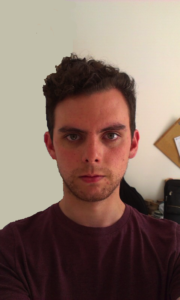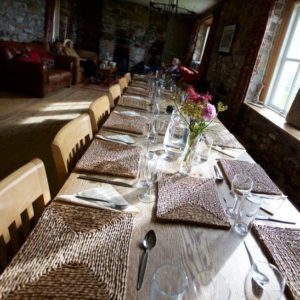Earlier this year, our Mairi Hedderwick Travel Writing Bursary was won by Thomas MacColl.
Thomas attended the Travel Writing course in September this year. He has kindly written this piece for us about his experiences here.
In the first few days of this year, as Edinburgh huddled against sleet, wind and darkness, my partner and I decided to make a break for it. This was in spite of my efforts, in the last few days of last year, to soothe her itchy feet and convince us both that a calm, resolute life of occasional sunny days in a tiny, cold flat was really the most sensible option, and that we would be best advised to just put any highfalutin or adventurous ideas straight out of our heads and accept our lot. But then, in The Starbank Inn down by the Forth in Newhaven, over an after-going-back-to-work drink, a sudden frenzy of dreaming and planning gripped us. Before we knew it we had drunk three pints each and our table was covered in napkins, scribbled all over with distorted maps of the world, names of countries and people we knew on various continents, and vague and optimistic numbers related to the cost of seeing them all.
Over the following couple of months the resolve of that first evening’s scheming didn’t fizzle away, as these things so often do, and we started to get serious about going travelling. We made long lists of the things we’d need and started researching, buying, finding and borrowing to tick them off. We frazzled our brains trying to work out how we could make it to every country scribbled on that first napkin, then relaxed into a rationalised plan to start with a long trip around India and Nepal, followed by a North-Westerly hop-skip-and-jump to Canada via the Northern Isles, Faroes and Iceland – with the option of carrying on if we get the knack of it and the money holds out. Perhaps most importantly, we started telling people—friends, family, strangers—that we were going, on the principle that once everyone expects you to do something exciting, it becomes very hard to chicken out. And, as part of this process, Catriona suggested I apply for the Mairi Hedderwick Travel Writing Bursary at Moniack Mhor.
As seems to be the case for many people in Scotland who have a literary interest, I’d heard of Moniack before through reputation, I’d met people who’d been on courses and loved it, and I’d greedily scoured the programme, imagining myself there and resolving to one day save up the money and go. Catriona and I are both keen readers and writers, and want to write about the things we see, do and learn while on our travels, so the chance to attend the Travel Writing course seemed a perfect opportunity to prepare for that. Not having a book in progress or a publication history to speak of, I thought it was a long shot, but one Sunday afternoon in spring I sat down, filled in the application form, told the story I’ve just told you, and sent it away.
We were at Catriona’s parents’ house in County Clare when I got the call to say that I’d been offered the place. I saw I’d missed a call from a number I didn’t recognise and, as usual, dismissed it out of hand. However, curiosity got the better of me and I looked up the number; when I discovered it was for Moniack Mhor, a little excitement began to stir. I managed to call back and, despite the patchy coverage at both ends, understood that they’d chosen me for the bursary, at which point I wandered around the garden a couple of times in a delighted daze. As it happened, we were setting off that afternoon for a week’s holiday in Connemara, a rugged and traditional Irish-speaking area in the far west of the country. Feeling a sudden need to do my homework, I immediately set to making notes and writing up my experiences there, so that I’d have a bit of practice and something to show when I arrived at the course.
A couple of months later it came time to travel up to Inverness for the week. It was a gorgeous clear day, and the bus journey was beautiful, but as I travelled northwards I felt nerves creeping in, nerves which intensified as I waited on the train station concourse to find out who I’d be spending the week with. I was the first there, with about half an hour to imagine how erudite, eloquent and intimidating they would be, but in the end the first person I met was a jolly local taxi driver, holding a tatty sign reading “writers’ course”. Soon the train pulled in and I met my first couple of colleagues for the week, and by the end of our taxi ride through the hills we’d already made several connections: one was a fellow Fifer, the other two had both lived in Spain, we’d enjoyed the same writers or the same Celtic Connections shows; it already felt like I would be at home.
As we got into the week, this proved to be absolutely true. The course was stimulating and helpful, the hospitality was excellent, and the setting was beautiful. On the first evening our two tutors introduced themselves over a welcoming drink, and set out what they’d be taking us through. Each morning they took turns to lead the whole group in a class focusing on a particular aspect of travel writing, with examples from their favourite travel books and writing exercises to draw us out, get us to share our work with each other and practice the techniques described. In the afternoons we had the opportunity to arrange one-to-one sessions with each of the tutors; when you didn’t have a session, you were free to write, read or explore the area (as long as the weather allowed this). While it was tempting to just put my feet up by the fire, walk out into the woods, or even—as some did—sneak in a post-lunch nap, there was also a pressure to be productive – even if it only came from within. The tutors needed your work in advance of the one-to-one sessions, there was a group reading scheduled for the final evening, and after all, how many times would I have this opportunity? Most likely only the once – so I endeavoured not to let the hours in this special place slip through my fingers, with varying degrees of success.
As well as Sara Wheeler and Michelle Jana Chan as our tutors, two hugely experienced and dedicated writers covering the whole array of travel writing potential, we were lucky enough to have two guest speakers join us in the evenings; it’s quite incredible to have an author pop in for a chat and a glass of wine when you’re tucked away by a wood stove on a Highland hillside. Hugh Thompson and Bill Colegrave kept us entranced with tales of the places they’d travelled, the books they’d written and read, and advice on writing and publishing. All the writers there were so open, happy to talk to us about their work, our work and others’ work, and seemed to pleased to be there, that it felt more like a group working together than students and teachers, or worse, fans and celebrities. By the time it came to the final evening and we gathered around to read a piece of what we’d each written that week, everyone knew each other’s stories and hopes, could place their writing in that experience and talk about it enthusiastically; conversations which carried on, for some of us, well into the early hours of our final morning.
One of the reasons diligent writing in the afternoons proved to be a challenge was the incredible setting. Our week there was bookended by a couple of beautiful days, while grey and drizzly weather in the middle of the week necessitated staying indoors and feeling productive. On the first afternoon there I packed my homework and took a walk out to Loch Lait on the recommendation of one of the staff members – a couple of miles strolling through the bright, cool, sweet air took me to the side of a sparkling pool. The shrieks of children playing carried across from the forest, and a pair of buzzards spiralled upwards overhead. A single fisherman was bobbing on the loch in a dinghy, casting and recasting. Butterflies danced around in white, brown and blue, a dragonfly stumbled into my shoulder, and a fat hairy caterpillar squiggled its way across the road. While in Edinburgh we’d already had the first few days of winter, this seemed like a second shot at the last day of summer.
But I haven’t spoken about the hospitality at Moniack Mhor, which made us all feel so at home and made the week so special. There was always somebody to talk to or ask questions, not in a clinical professional way, but simply because they were so approachable and were hanging around – at one point I entered the office to ask about buying a book, and was immediately given a handful of chocolates. Every morning, waking reluctantly after a late night of drinking, chatting and/or writing, we would shuffle downstairs to be greeted by fresh coffee, toast, fruit, cereal and anything else you could possibly want. I can’t decide whether lunch, similarly welcome after an intensive morning of tutoring, would be better described as a ‘smorgasbord’ or a ‘cornucopia’, and in the evenings everyone took a turn at creating another groaning table of deliciousness, before we settled down around a blazing fire to read and talk. The cosy and welcoming nature of both the buildings and the people there created the perfect atmosphere, and brought us all closer together.
As I write this, my flat is empty, all of our stuff either boxed up and crammed into the corners of my parents’ garage, or set aside to go in our backpacks for the great departure, and I have to get back to cleaning dust out of forgotten nooks and crannies, hanging banal Ikea prints back on the walls, and all the other pernickety little jobs that need doing for the moving-out inspection. It’s time for us to set off on our travels – and the skills I learned and experiences I shared at Moniack Mhor are already making it all the more exciting.






